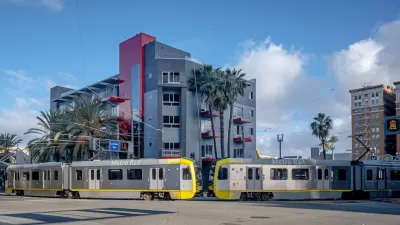Thanks to parking reforms at the state level, Oregon cities are rapidly eliminating parking requirements, paving the way for more affordable housing construction and higher density.

Minimum parking requirements are quietly being eliminated in cities across Oregon, writes Catie Gould for the Sightline Institute.
Normally, parking is one of the most contentious issues for local governments. Any relaxation of parking mandates—rules that prescribe a certain minimum number of parking spaces for any new home or business—is a political hot potato. But new state parking rules have taken that status quo off the table and turned what could be a big debate into a boring compliance exercise.
Cities that want to retain parking minimums under the new state law would have to comply with a complex series of regulations, making the choice to eliminate parking mandates an easy one for many communities. “Now over a million Oregonians live in communities where parking is fully voluntary. More cities are poised to join them the next year, after using a deadline extension granted by the state.”
The domino effect is aided by another law passed in early 2022 that removed parking mandates on developments near transit corridors and stations, which, in some cities, cover the majority of lots. Fully eliminating parking minimums also means cities don’t need to adjust requirements when transit service changes, making it easier for property owners to build ADUs and other ‘missing middle housing’ that is often made too costly by the addition of parking.
FULL STORY: PARKING MANDATES ARE VANISHING ACROSS OREGON

Planetizen Federal Action Tracker
A weekly monitor of how Trump’s orders and actions are impacting planners and planning in America.

Maui's Vacation Rental Debate Turns Ugly
Verbal attacks, misinformation campaigns and fistfights plague a high-stakes debate to convert thousands of vacation rentals into long-term housing.

Restaurant Patios Were a Pandemic Win — Why Were They so Hard to Keep?
Social distancing requirements and changes in travel patterns prompted cities to pilot new uses for street and sidewalk space. Then it got complicated.

In California Battle of Housing vs. Environment, Housing Just Won
A new state law significantly limits the power of CEQA, an environmental review law that served as a powerful tool for blocking new development.

Boulder Eliminates Parking Minimums Citywide
Officials estimate the cost of building a single underground parking space at up to $100,000.

Orange County, Florida Adopts Largest US “Sprawl Repair” Code
The ‘Orange Code’ seeks to rectify decades of sprawl-inducing, car-oriented development.
Urban Design for Planners 1: Software Tools
This six-course series explores essential urban design concepts using open source software and equips planners with the tools they need to participate fully in the urban design process.
Planning for Universal Design
Learn the tools for implementing Universal Design in planning regulations.
Heyer Gruel & Associates PA
JM Goldson LLC
Custer County Colorado
City of Camden Redevelopment Agency
City of Astoria
Transportation Research & Education Center (TREC) at Portland State University
Jefferson Parish Government
Camden Redevelopment Agency
City of Claremont





























